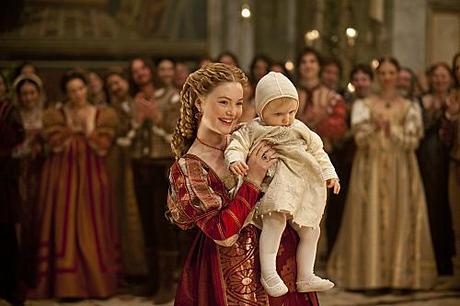Contributor: John Keegan
Written by David Leland
Directed by David Leland
As noted repeatedly, the writers make adjustments to the historical record whenever the dramatic license is required to make the story flow in the right direction. That is certainly true in this episode, where various events are rearranged to bring season arcs to their logical resolution. Not only is the matter of Juan’s descent handled in the expected fashion, but Savonarola saw his comeuppance far earlier than anticipated.

Juan’s dispatch at the hands of his brother is mildly surprising, if only because of how personal the action ultimately was. Even the innuendos of history point to Cesare as the architect of the murder; there’s little indication that he would have done the dead himself. But for the purposes of the show, it made a lot of sense. Juan was spiraling out of control, between the effects of the syphilis and opium addiction, and since Rodrigo was unwilling to act in the best interests of the family, who else but Cesare would do so?
This doesn’t absolve Cesare or Lucrezia of the responsibility for fratricide. Both of them knew exactly what they were doing. It’s also not the first time that they made a move against their dear brother. Lucrezia’s determined requests to Cesare were a reminder of her character’s turning point, when she tried to kill Juan with the chandelier. Cesare, of course, tried to see to Juan’s death by allowing the ambush at Forli. It was a foregone conclusion that brother and sister would conspire to bring Juan to this end.
In terms of timing, this event was supposed to happen roughly a year later; similarly, the feud with Savonarola went on for some years after the infamous “bonfire of the vanities”. (The real Savonarola even sent the Pope a letter of condolence on Juan’s passing!) But it makes sense for victory over Savonarola to come as counterpoint to the loss of Juan, and for both a key victory and a personal tragedy to distract Rodrigo at the most inopportune moment.
Savonarola’s turnabout was a bit quick, by that regard. While his zealous brand of faith was never in question, it was unclear whether or not he truly believed that he was favored by God to such a degree. At least some of Cesare’s gambit was reliant on the notion that Savonarola was too far gone to see the trap being set. As well as the scene in the fire worked, I’m not sure the episodes leading up to this point made Savonarola’s madness as evident as it might have been. Still, watching his followers turn on him so quickly, after acting as his spiritual shock troops, made for a telling commentary on religious fervor.
Also unusual was the treatment of Giovanni’s baptism. One of the more interesting aspects of the Borgia legacy was how the child was portrayed to the public. After all, Lucrezia’s marriage to her first husband was ended on the pretext that there was no consummation. Historically, regardless of rumor, it was thought to be Cesare’s son from an affair. For Lucrezia and her family to display her relationship to Giovanni so openly would have been a major issue in terms of her future prospects.
Taking out Juan in this episode leaves the fallout to the season finale, where the attempt on his life by his new taster will undoubtedly take place. It would be disappointing if that were the “shocking” event happening at the very end of the finale, as the promos promise. It’s been telegraphed to the hilt, so it would be far more effective if that attempt happened early, leaving something more surprising to the very end.
Writing: 2/2
Acting: 2/2
Direction: 2/2
Style: 2/4
Final Rating: 8/10

